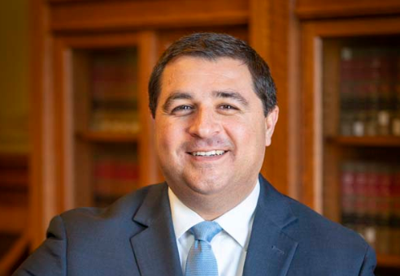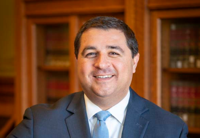
Kaul
MADISON, Wis. – Wisconsin dairy-farming groups can challenge what they call the “repugnant” relationship going on in the state’s highest law office.
Calumet County judge Carey Reed this month refused to dismiss the lawsuit against state Attorney General Josh Kaul, who has hired a lawyer with a climate-change agenda and whose salary is paid by an advocacy group. Dozens of lawsuits have been pushed by government officials aligned with private lawyers, but President Donald Trump has forbidden any more against the oil industry in an executive order.
The Wisconsin Dairy Alliance and Venture Dairy Cooperative sued over the arrangement, which has been called into question in several other states. A Bloomberg Philanthropies-funded program at the NYU School of Law provides the salaries of activist attorneys general.
“This case presents the question whether the Wisconsin Department of Justice is for sale,” the dairy groups wrote in a February complaint.
The first hurdle to leap was proving they had a right to challenge what goes on in the AG’s office. Judge Reed turned to a COVID-era ruling in a lawsuit brought by a taxpayer against executive orders that held the plaintiff had a legal interest in alleged misuse of taxpayer money.
The climate change lawyer will push litigation that affects the members of the dairy groups, Reed said.
“Plaintiffs have a legal interest to contest governmental actions leading to what they believe is an illegal expenditure of taxpayer funds,” Reed wrote.
“The DOJ’s expenditure of taxpayer funds, such as those to pay for the fellow’s travel expenses, bar dues and court fees, gives plaintiffs a legally protected interest to challenge the DOJ’s contract with NYU/the fellow.”
Challenges years ago focused on communications between AG offices and the NYU School of Law State Energy and Environmental Impact Center. Last year, the Milwaukee Journal Sentinel reported that Kaul hired Karen Heinemen with an annual salary of $90,000 to be paid by the NYU program.
Complaining of former New York City mayor Michael Bloomberg’s “far-left” agenda, the dairy groups said, “such an arrangement between a special interest group and a Republican attorney general would be just as outrageous and unlawful.”
“It is not difficult to imagine how a ‘Second Amendment Fellow’ deputized as a (special assistant attorney general) by the Gun Owners of America would be received,” the complaint adds. “Or an ‘Anti-Abortion Fellow’ empowered to act on behalf of the State while being paid by the National Right to Life.”
Republican members of Congress last month announced an investigation into the NYU program, with Kentucky’s James Comer, the chair of the House Committee on Oversight and Government Reform, questioning the motives.
None of the NYU fellows have been placed in Republican AG offices.
“The circumstances surrounding the State Impact Center raise questions as to whether participating state attorneys general are acting on independent judgment to best serve the interests of their states’ citizens,” Comer said.
“The Bloomberg-NYU partisan agenda will likely hurt working-class Americans in the name of partisan globalist climate agenda. The average American household will pay the cost of this destructive agenda in the form of subsidies and regulations, fewer energy options, taxes to fund federal agencies’ legal defense and higher utility bills.”
Environmental litigation can take many forms, but the biggest target is currently Big Oil, which recently asked the U.S. Supreme Court to put an end to the approximately 40 cases it faces nationwide.
Seven judges in South Carolina, Maryland, New Jersey, New York, Delaware and Pennsylvania have found the cases involve questions of international emissions standards better left to the federal government.
Dozens of lawsuits brought by government officials who hired contingency-fee lawyers remain pending. Colorado's and Hawaii's supreme courts refused to grant motions to dismiss cases there.
Private lawyers who scored government contracts crafted their complaints to keep them out of federal courts, where companies like Exxon and Chevron had stronger defenses. The lawsuits allege violations of state laws of consumer protection and public nuisance and allege the public wouldn’t have used as many fossil fuels as it did had the industry been more honest about their effect on the environment.
Bucks County, Pa., judge Stephen Corr noted that the county's complaint used the word "emissions" more than 100 times, while "deceptive" and "deception" were used only 39 times combined. He threw out the case as an attempt to regulate the international emissions market masked in consumer protection.
Judge Videtta Brown, in Baltimore's case, said the litigation goes beyond the limits of Maryland law, or whatever states other cases are filed in.
"This Court holds that the U.S. Constitution's federal structure does not allow the application of state court claims like those presented in the instant cases," Judge Steven Platt wrote in tossing Annapolis' case.
"The States such as Plaintiffs here... can participate in the efforts to limit emissions collaboratively, but not in the form of litigation... If states and municipalities [or] even private parties are dissatisfied with the federal rulemaking or the outcome of cases, they may seek federal court review."








